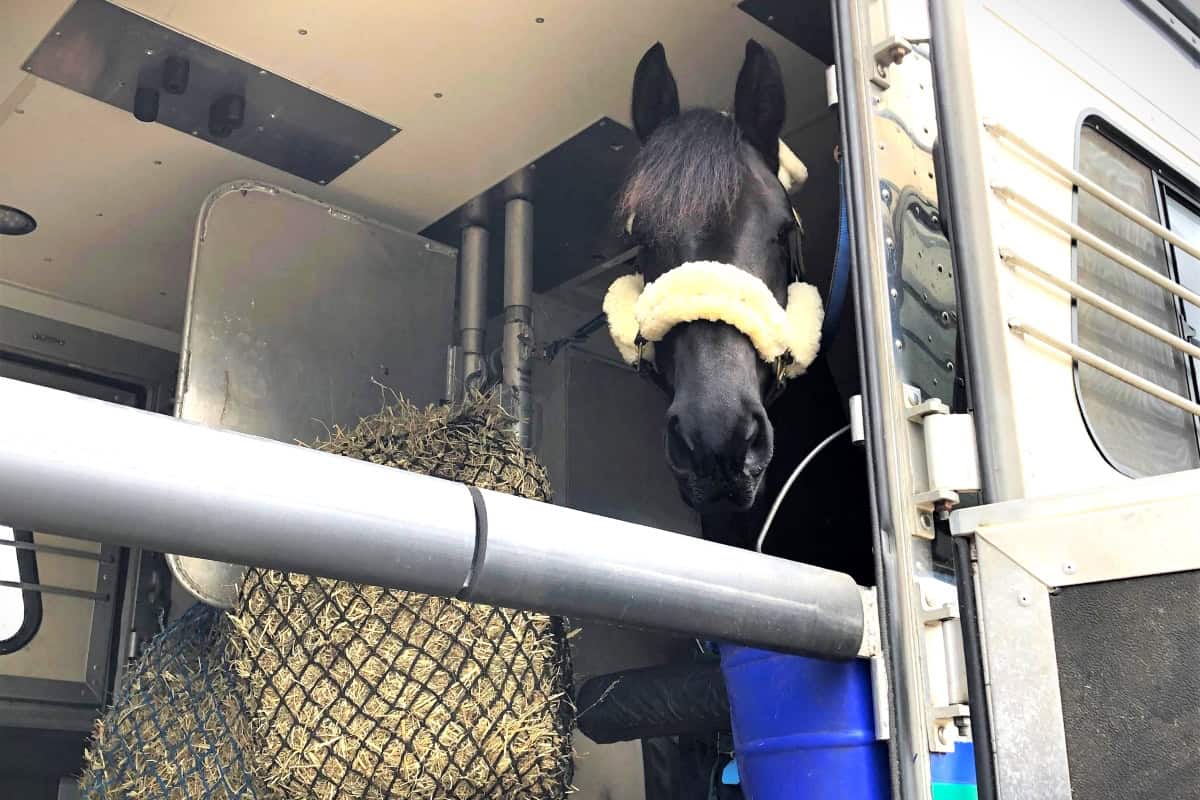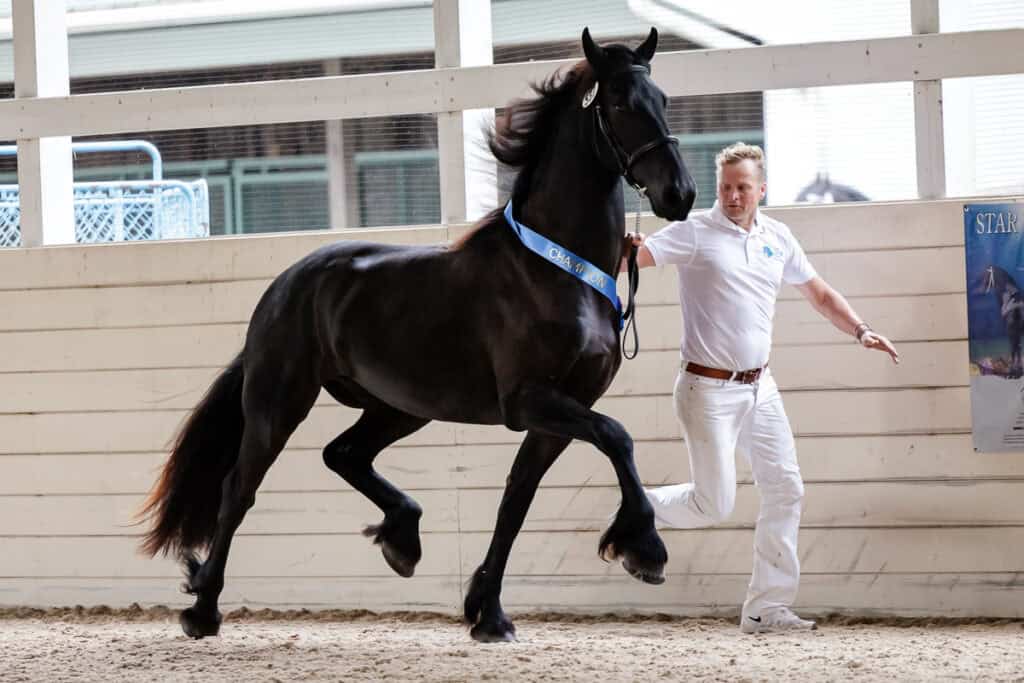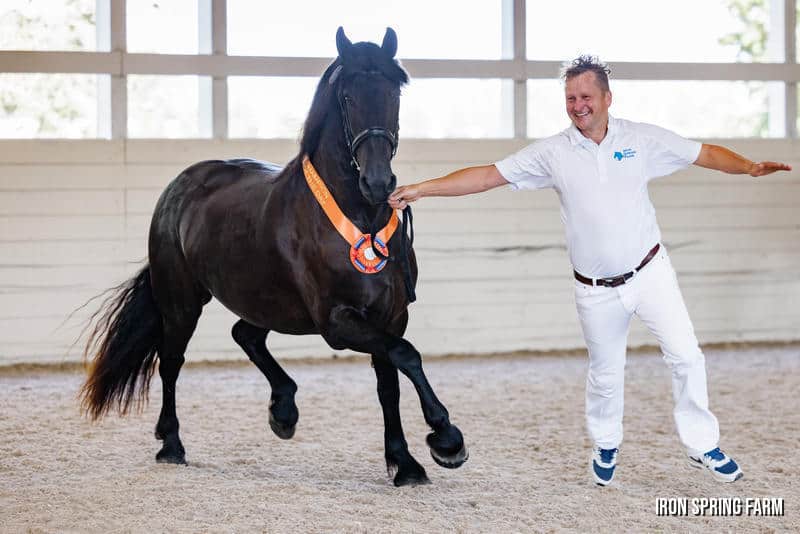Travel Like a Pro
Prepare Your Horse for Long-Distance Hauling
Getting your horses ready for long-distance travel requires preparation and planning. We share our system that begins in the weeks leading up to travel and carries all the way through until the horses step off the trailer at their new location.
Preparation
Make sure your horse is current on vaccinations and paperwork several weeks before your trip. You want to give the vaccines at least 10 days prior to shipping to allow for any reaction to resolve. We ship to Florida, so our horses receive EWT/WN and Potomac boosters. We typically give these vaccines one month prior to shipping, if possible.
We also vaccinate with Calvenza (every six months), rabies, strangles, botulism etc. You will need your horse’s health and vaccination history to take on the road with you. Although we don’t need rhino/flu records to enter Florida, the USEF has required proof of vaccination since 2015 in order to show.
You will also need to have a current negative coggins test. Be sure to inspect your documents for errors, with everything matching up with the horse you are shipping. There are mistakes and it’s better to catch them at home rather than at the agricultural inspection station in Florida!
The week of shipping, our veterinarian issues health certificates for all horses who are traveling. In order to complete the paperwork, your veterinarian will need to physically inspect your horse for any signs of illness. This includes taking his/her temperature and other vital signs.
Your Vehicle
If you’re hauling your horse yourself, it’s important to have your truck and trailer inspected.
Our drivers have a pre-trip routine, which includes a 20-point inspection on the truck and trailer: checking the windshield wipers, fluids, tire pressure, all electrical hook ups, changing the oil and a rust check. It’s important to put your eyes on the axles and lug nuts and check tire condition, including dry rot, especially if you don’t haul frequently.
Be sure you know the weight limit for your license type. This differs state to state, but typically a Class C license can drive a trailer with a gross weight of under 25,000 lbs.
The Medical Kit
You never know what will happen on the road, so it’s good to be prepared. Your medical kit should include bandages, VetWrap, Elastikon, triple antibiotic ointment, white gauze, Banamine paste, duct tape and extra halters and lead ropes. If you haven’t made a long haul before, ask your veterinarian to review your kit to ensure you have everything you need.
The Week Before
Hydration is critical prior to and during the trip. Consider adding Horse Quencher or apple juice, etc. to the water to encourage your horse to drink more.
A week before we’re set to leave, we start wetting the horses’ grain to get more water in their systems. You can also soak their hay to aid in hydration.
Two days prior to shipping, we add mineral oil to their grain. We start with 4-ounces, increase to 6-ounces the day before shipping and up it to 8-ounces the day of travel. Mineral oil is a mild laxative and helps with passing manure.
In addition to the mineral oil, we start them on one full tube of GastroGard two days prior to shipping and continue it for five days. If your horse shows signs of stress, you may want to continue GastroGard during the adjustment period to the new place.
You will also want to monitor your horse’s temperature prior to travel to establish a baseline for their normal.
Another important bit of preparation is packing plenty of hay and extra water for the horses. Always plan for unexpected challenges and delays.
On the Trailer
We are fortunate to be able to ship our horses in box stalls. If your horse is traveling in a standing stall, be sure to clip the cross tie higher up on the halter, by the jaw, so he can more easily lower his head. Access to fresh, clean water—two buckets per horse—is a must.
We typically start with a half-bale of the hay they’ve been eating at home. We put it on the ground so their airways can drain. You do not want to switch hay prior to, during or immediately after travel, so pack enough hay to last to their destination and beyond.
Our stalls are bedded with shavings during travel. Bed deep to make a softer ride for your horse.
As far as wraps or clothing, we usually ship our horses in front bell boots and sometimes hind bell boots as well. Blanketing depends on outside temp. Always consider changes in outside temperature from the start to the finish of your trip. It’s better to err on the colder side rather than having your horse overheat. Good options for travel are Irish knits, wool coolers, and any clothing that breathes. (Some shippers will blanket and unblanket, but some will not change anything on your horse once she is on the trailer. Be sure to ask.)
Monitoring your horses during travel is crucial. We have cameras so we can keep a close eye on each horse. During stops, we ensure they have fresh water and hay, and check them over for any scrapes, signs of distress or colic symptoms.
Typically, less experienced horses will be a little unsettled for the first 30 minutes to one hour. Once they get their legs under them, they usually settle into the trip.
We do not layover during our long hauls, but we do give the horses long breaks throughout the trip so they can rest, drink more water and have a chance to urinate. Many horses won’t urinate on a moving trailer and it’s important that they have an opportunity to do so. Keep in mind that traveling on the trailer for eight hours is equivalent to walking for eight hours. Rest, recovery and relaxation on long trips is essential.
Tips for Layovers
Biosecurity and safety are the biggest concerns with layover facilities, so do your research and ask for referrals. Also be sure to communicate arrival and departure dates so everyone is on the same page.
Questions to ask a potential layover facility:
- Will your horses, and other traveling horses, be isolated? This keeps your horse and any permanent residents safe.
- What health paperwork is required?
- How are the facilities cleaned and disinfected between stays? (Use your own buckets from home for grain and water.)
- Have they had any sick horses on the property in the last 30 days?
- Is bedding provided?
- Is someone checking on the horses through the night?
While traveling long-distance with your horses requires a lot of preparation and care, the fun and excitement of showing and training outside your usual venues is a wonderful experience to have with your horse. Safe travels!
Disclaimer:
All content provided by Iron Spring Farm is general and for informational purposes only. Content may also not constitute the most up to date information. Nothing in this content is intended to constitute veterinarian advice or to serve as a substitute for consultation with a veterinarian. Always seek the advice of your veterinarian or other qualified provider with any questions that you may have about the treatment and care of your horse.
Any reliance that you place on the information provided is strictly at your own risk and Iron Spring Farm, its officers, employees, representatives, and agents, hereby disclaim any and all liability to any party for any direct, indirect, implied, punitive, special, incidental, consequential or other damages arising directly or indirectly from access to or use of any content provided to the maximum extent permitted by law.










